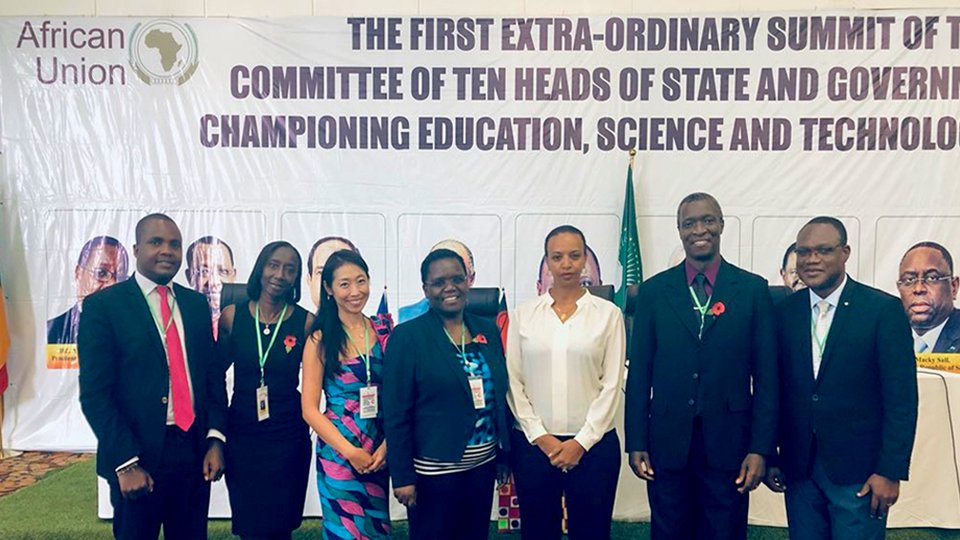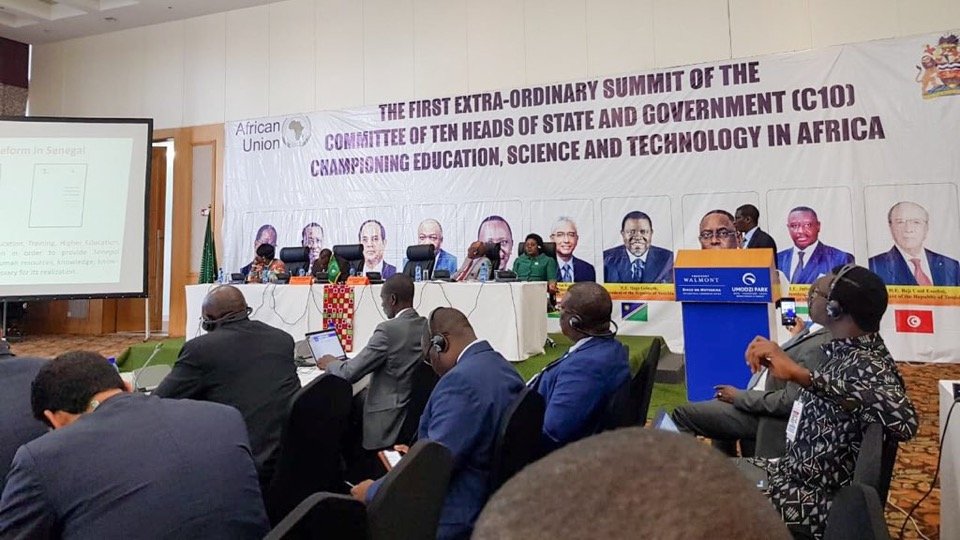ADEA and AfDB present the feasibility study results of the African Education Fund at the C10 Meeting in Malawi


The Association for the Development of Education in Africa (ADEA) in partnership with the African Development Bank Group (AfDB) presented the feasibility study results of the African Education Fund (AEF) during the African Union’s First Extra-Ordinary Summit of the Committee of Ten (C10) Heads of State and Government Championing Education, Science and Technology. The Fund received strong support from the Summit’s final declaration, with the C10 incorporating its operationalization in the action plan. Under the theme “Enhancing Education, Science, Technology and Innovation (STI) for Africa’s Development”, the Summit took place at Bingu International Conference Centre in Lilongwe (Malawi) from 2nd to 3rd November 2018.
Africa’s Agenda 2063 recognizes education, science, technology and innovation as crucial catalysts for empowering African citizens and especially the youth to steer social economic development and growth towards an integrated, peaceful and prosperous Africa. The Continental Education Strategy for Africa 2016-2025 (CESA 16-25) gives life to this recognition through its 12 strategic objectives on education. To this end, the main purpose of the first C10 summit was to agree on a framework aligned to CESA 16-25 for achieving Africa’s Agenda 2063 through enhanced investment and strategic multi-sectoral private and public sector partnerships in the development and promotion of STI in Africa and beyond.
Chairing the opening ceremony of the Ministerial Session, H.E. Prof. Mary Teuw Niane, Minister for Higher Education, Research and Innovation of Senegal and Chairperson of ADEA Steering Committee noted the efforts taken by the African Union Member States to pull together skills and knowledge to support our continent in the fields of education and innovation. He also highlighted the efforts undertaken by Senegal to enhance STI in Africa, including the creation of Senegal’s City of Knowledge.
In his keynote speech, H.E. Bright Msaka, Minister of Education, Science and Technology of the Republic of Malawi welcomed all the participants and reiterated the fact that tomorrow’s world will stand on the bedrock of STI, hence the need for Africa to invest more in building capacities in this area at all levels of education.
ADEA and AfDB in their joint presentation noted that AEF is a unique, Africa-initiated fund designed, owned, and led by Africans. It is about African ownership, continuity, and gaining control of long-term sustainability for education and training systems in the African continent.
Sharing the results of the AEF feasibility study, Mr. Shem Bodo, Acting Executive Secretary of ADEA recalled that “in their great wisdom and vision, our founding leaders were categorical that Africa must unite; that our destiny is in our hands; that we must mobilize ourselves and our own programs to determine the results that we want; that we need to embrace the principle of self-reliance as a key ingredient of this ownership, in being accountable for the results we realize; and that we must guide the financing of our own development”. He informed the Ministerial session that African Ministers were the first to call for a fund for Africa’s education in 2006 during the launch of the Plan of Action for the Second Decade of Education for Africa. The African Union Summit endorsed the setting of such a fund in 2007 following discussions at the then second and third Conference of Ministers of Education of the African Union (COMEDAF II&III). The African Education Fund received a life and a voice at the highest political levels at the ADEA 2017 Triennale held in March in Dakar (Senegal), from H.E. Macky Sall, President of the Republic of Senegal to Dr. Akinwumi A. Adesina, President of the African Development Bank Group (AfDB). ADEA and AfDB followed the Dakar declaration by commissioning a feasibility study, with support from the Government of Japan.
The Summit saw the participation of the C10 African Union Heads of State and Government from Malawi and Namibia, the Prime Minister of Senegal, AUC Commissioner for Human Resources, Science and Technology (HRST) and Ministerial representatives from Mauritius, Kenya, Tunisia, Egypt, Chad, and Sierra Leone. Also in attendance were the respective Ministers, Senior AUC Government Officials and high-level partner representatives that included ADEA and AfDB. The African Union established the C10 on Education, Science and Technology in Africa in 2016 after noting that education and STI remain the primary instruments that will enable Africa to effectively implement its transformative Agenda 2063.
H.E. Macky Sall, President of Senegal, chairs the Committee while H.E. Prof. Arthur Peter Mutharika, the President of the Republic of Malawi is the second Vice Chairperson. The composition of the Committee includes two Presidents from each of AU’s Five Continental Regions and draws its membership from Chad, Egypt, Gabon, Kenya, Malawi, Mauritius, Namibia, Senegal, Sierra Leone, and Tunisia.
===============================
For more information, please contact:
- Shem Bodo, Acting Executive Secretary, ADEA, T. (+225) 2026 4262, s.bodo@afdb.org
Media:
- Stefano De Cupis, Senior Communications Officer, ADEA, T. (+225) 2026 4261, s.decupis@afdb.org
===============================
About ADEA
The Association for the Development of Education in Africa (ADEA) is a forum for policy dialogue. It is a partnership bringing together African policymakers in charge of education, science and technology; development partners; researchers and education technical experts. ADEA contributes to the empowerment of African countries to develop quality education and training systems that respond to the countries' emergent needs and drive social and economic transformation sustainably. www.adeanet.org
About AfDB
The African Development Bank Group is Africa’s premier development finance institution. It comprises three distinct entities: the African Development Bank, the African Development Fund and the Nigeria Trust Fund. On the ground in 41 African countries with an external office in Japan, the African Development Bank contributes to the economic development and the social progress of its 54 regional member states. www.afdb.org
About AUC
The African Union Commission is the key organ playing a central role in the day-to-day management of the African Union. Among others, it represents the Union and defends its interests; elaborates draft common positions of the Union; prepares strategic plans and studies for the consideration of the Executive Council; elaborates, promotes, coordinates and harmonizes the programmes and policies of the Union with those of the RECs; ensures the mainstreaming of gender in all programmes and activities of the Union. https://au.int/en/organs/commission